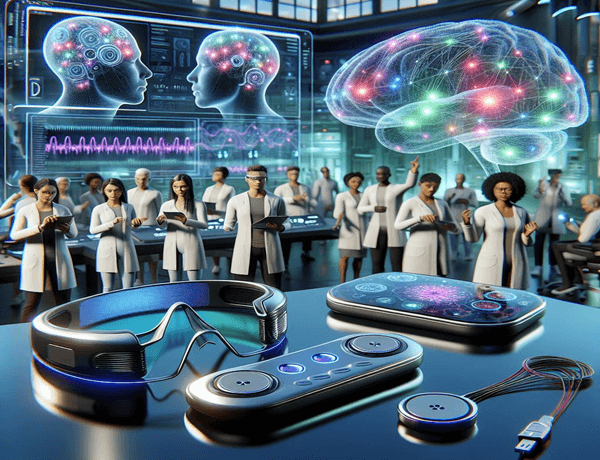Neurotech devices are bridging the gap between technology and neurology
Published Date: 20 Sep 2024
Neurotechnology is the field that brings together the accuracy of computer technology and mental strength. Undoubtedly, the convergence of neurology and technology is one of the most interesting fields in which the boundaries of technological applications are being pushed. This new area bears the promise of bringing a change in the ways of understanding the brain, mental health, and how researchers and scientists deal with the brain and its dysfunctions, from treating diseases like Huntington’s to curing several cognitive disorders.

How Neurotech Devices Bridge the Gap
Neurotech Startups
Neurotech startups are emerging as an interesting and promising firm that connects technology with neuroscience. These businesses are using the latest technologies of both disciplines to create groundbreaking remedies that might advance healthcare, expand the current understanding of the brain, and boost human performance. They aim to discover how stimuli affect brain activity and to interpret and decode the signals that neurons in the brain use to communicate with the body. Some of the top neurotech companies are Neuralink, Kernel, Neurable, Synchron, and Blackrock Neurotech.
Brain-Computer Interfaces (BCIs)
BCI are devices that help humans to operate computers and even robots using their thoughts. Elon Musk, for example, founded the Neuralink project, which intends to build implantable BCIs to enable people with spinal cord injuries to restore mobility.
VR-assisted rehabilitation therapy
By using novel technologies along with neuroscience, researchers can create virtual worlds that mimic real-world situations and observe brain reactions. Virtual reality is a novel strategy that helps patients recover from both physical and neurological disabilities. It is successful in treating patients with phobias and post-traumatic stress disorder (PTSD). In addition, assisted therapy can also be used to treat several locomotory issues, postural rehabilitation, balance, and spatial navigation by introducing them to safe and regulated virtual worlds.
Brain Training and Cognitive Enhancement
Employment of neurofeedback methods in various brain training programs can enhance the memory, concentration, and problem-solving abilities of the patient. These programs take advantage of the brain's neuroplasticity, or the capacity to create new neural connections to maximize cognitive performance.
Neuroprosthetics
Neuroprosthetics use technology to restore lost functions like cochlear implants and robotic limbs controlled by the brain. Cochlear implants enable people with major hearing loss to recognize sound by converting sound waves into electrical signals that stimulate the auditory nerve. Similarly, retinal implants help patients who are visually impaired to regain partial vision by stimulating the retina.
Personalized Neurological Therapy
Neurofeedback devices help in tracking the activity of a person's brain and provide personalized neurostimulation and behavioral therapy. These devices are based on active brain data collection and can provide personalized treatments to the patients for cognitive function either by the reduction of anxiety or by improved concentration thus bridging the gap.
Legal and Ethical Impacts
With such wonders, neurotechnology also brings along some major moral and legal concerns including informed consent, privacy, and misuse of neurotechnological advances. When using BCIs for non-medical applications, such as mind-reading technology or brain-controlled video games, privacy and personal autonomy issues may arise. The need to address such issues is essentially of high importance, neurotech also provides a platform to deal with such issues responsibly by filling the gap between neurology and technology in a way that is ethical and legally constructive.
The Future Landscape of Neurotechnology
- With Neurotechnology's continuous advancement, a very promising future awaits our well-being. Personalized neurostimulation therapies based on individual neural profiles have the potential to transform the way different mental health disorders are treated.
- Furthermore, it is anticipated that combining artificial intelligence with Neurotech will improve our capacity to understand complicated brain data thus opening the door to more precise diagnosis and personalized therapies.
- Wearable neurotech devices might become common owing to the continuous monitoring and early detection of neurological diseases.
- Neurotechnology can revolutionize health, human enhancement, and cognition knowledge based on neural patterns, decode neural patterns, and facilitate direct connection between the brain and computers.
Neurotechnology has shown many promising and endless opportunities ranging from healthcare sectors to cognitive improvements, but the related ethical issues should be resolved to make sure that neurotech is used ethically for the sake of humanity. By decoding the secrets of the human brain, the future holds a dynamic landscape where the lines between humans and technology will become increasingly blurred.
Conclusion
Neurotech devices are revolutionizing the intersection of technology and neurology, offering transformative potential for both healthcare and cognitive enhancement. As we advance in our understanding and application of these technologies, it is essential to address the ethical considerations to ensure their responsible use. By bridging the gap between the brain and technology, we are not only paving the way for groundbreaking innovations but also shaping a future where the integration of human and technological capabilities holds incredible promise. As we continue to explore and refine neurotech, we must remain vigilant in balancing innovation with ethical responsibility, striving to enhance human well-being and expand the horizons of what is possible.
Maximize your value and knowledge with our 5 Reports-in-1 Bundle - over 40% off!
Our analysts are ready to help you immediately.
